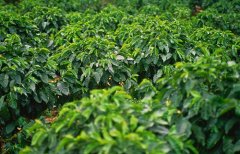Rich texture and unique soft floral fragrance of Yejia snow coffee producing area manor introduction
Yega Xuefei's coffee trees were planted by monks in Europe and later transferred to farmers or cooperatives. Yega Xuefei is actually constructed by the surrounding coffee communities or cooperatives, including: Hafusha, Hama, Biloya.
These mountain villages are foggy, like spring all year round, with a gentle breeze in summer, cool but not hot, rain but not damp, and no cold damage in winter, giving birth to a unique regional flavor of citrus and flowers. Coffee trees are mostly planted in farmers' own backyards or mixed with other crops in the fields. Yejasuefei is a small town with an elevation of 700-21000 meters, which is synonymous with Ethiopian boutique coffee. It has been a wetland since ancient times. The ancient saying "Yirga" means "settle down" and "Cheffe" means "wetland". The mode of production and flavor of coffee here are so outstanding that Ethiopian coffee farmers compete to be proud of the flavor of their own coffee. To become the most famous coffee producing area in Africa, Ethiopia's Yirgacheffe coffee is delicate, delicate and sweet. As the hometown of coffee, thousands of years of planting history and processing tradition in Ethiopia have created high-quality washed Arabica beans. Light baking has unique sweet aromas of lemon, flowers and honey, soft acidity and citrus flavors, fresh and bright on the palate. No milk or sugar, let the rich texture and unique soft flower scent brush your taste buds, leaving an endless aftertaste

Important Notice :
前街咖啡 FrontStreet Coffee has moved to new addredd:
FrontStreet Coffee Address: 315,Donghua East Road,GuangZhou
Tel:020 38364473
- Prev

Can the bitter and sour coffee beans be blended together?
To make strong sour coffee beans, it is necessary to use Kilimanjaro coffee beans, on this basis, with Ethiopia's soft mocha plateau hara, Brazilian beans and moderate acidity Hawaii Kona, so that you can mix a comprehensive coffee formula with outstanding sour flavor: Guatemala SHB (40%), Kilimanjaro AA (30%), Mo.
- Next

The most famous boutique raw bean flower scent in the world. Ethiopia Yega Xuefei G2.
Ethiopia has the longest history in the world, not only in coffee production and drinking, but also in the world. Most of the production is exported to advanced countries, and unlike other coffee-producing countries, 50% of the coffee produced in Ethiopia is consumed domestically. Nevertheless, more than 60% of Ethiopia's total foreign currency exports still come from the coffee trade, which is enough to replace
Related
- Does Rose Summer choose Blue, Green or Red? Detailed explanation of Rose Summer Coffee plots and Classification in Panamanian Jade Manor
- What is the difference between the origin, producing area, processing plant, cooperative and manor of coffee beans?
- How fine does the espresso powder fit? how to grind the espresso?
- Sca coffee roasting degree color card coffee roasting degree 8 roasting color values what do you mean?
- The practice of lattes: how to make lattes at home
- Introduction to Indonesian Fine Coffee beans-- Java Coffee producing area of Indonesian Arabica Coffee
- How much will the flavor of light and medium roasted rose summer be expressed? What baking level is rose summer suitable for?
- Introduction to the characteristics of washing, sun-drying or wet-planing coffee commonly used in Mantenin, Indonesia
- Price characteristics of Arabica Coffee Bean Starbucks introduction to Manning Coffee Bean Taste producing area Variety Manor
- What is the authentic Yega flavor? What are the flavor characteristics of the really excellent Yejasuffi coffee beans?

